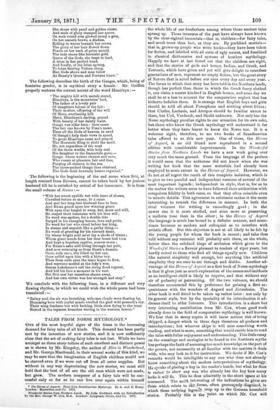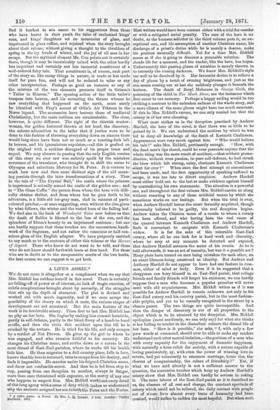TALES FROM NORSE MYTHOLOGY.* ONE of the most hopeful signs
of the times is the increasing demand for fairy tales of all kinds. This demand has been partly met by the invention of new stories, and it is now sufficiently clear that the art of making fairy tales is not lost. While we have amongst us three story-tellers of such excellent and distinct power as is shown by Mr. Kingsley, the author of Alice in Wonderland, and Mr. George Macdonald, in their several works of this kind, we may be sure that the imagination of English children would not be starved even if we were cut off from all outer supplies. But without in any way depreciating the new stories, we must still bold that the best of all are the old ones which were not made, but grew. The modern composer of a fairy tale will be suc- cessful only so far as he can live over again within himself
* The Heroes of Asgard: Tales from Scandinavian Mythology. By A. and E. Keary. London : Macmillan and Co. 1871.
Wonderful Storiee from Northern Lands. By Julla Goddard, with an Introduction by the Rev. George W. Cos, M.A. London: Longman, Green, and Co. 1871. the whole life of our forefathers among whom those ancient tales sprang up. These treasures of the past have always been known by the clear-sighted immortals—that is, children—for fairy tales, and much truer than fact, as they are. By purblind mortals— that is, grown-up people who write books—they have been taken for fiction, and labelled with all sorts of ugly names, and fossilized in classical dictionaries and systems of heathen mythology. Happily we have at last found out that the children are right, and that the stories of gels and heroes, Indian, and Greek, and Teutonic, which have given and yet will give delight to countless generations of men, represent no empty fiction, but the great story of Nature that is acted before our eyes every day and every year. . The forms in which that story has been told in the Northern lands, though less perfect than those in which the Greek fancy clothed it, can claim a nearer kindred in English homes, and some day we shall be at a loss to account for the comparative neglect that has hitherto befallen them. It is strange that English boys and girls should be told all about Persephone and nothing about Liana; that Clotho, Lachesis, and Atropos should be familiar names to them, but Urd, Verdandi, and Skald unknown. Not only has the Norse mythology peculiar rights to our attention for its own sake, but. those who know the Greek mythology will understand it far better when they have learnt to know the Norse too. It is a welcome sight, therefore, to sea two books of Scandinavian tales offered to us this new year. One of these, the Heroes of -Asgard, is an old friend now reproduced iu a second edition with considerable improvements. In the Wonderful Stories from Northern Lands we have a new work going over very much the same ground. From the language of the preface it would seem that the authoress did not know when she was writing her book that the same materials had already been employed to some extent in the Heroes of Asgard. However, we do not at all regret the result of this complete isolation, which is to give us two parallel and independent versions of several of the most important legends ; independent in style, that is, for as to the matter the writers seem to have followed their authorities with scrupulous fidelity in both cases, so that they often coincide even in minute details. This agreement in substance makes it the more interesting to remark the difference in manner. In both the rival volumes the writing is exceedingly good ; in the newer one it is more studied, and RUM more at preserving a uniform tone than in the other ; in the Heroes of Asgard the language is much less bound to a definite manner, and some- times becomes So modern and colloquial as to interfere with artistic effect. But this objection is not at all likely to be felt by the young people for whom the book is meant ; and tales thus told without any restraint will probably suit them, on the whole, better than the subdued tinge of archaism which gives to the Wonderful Stories a flavour pleasant to readers of riper years, but hardly suited to those who find all things equally new. Children like natural simplicity well enough, but anything like artificial simplicity they are sure to see through and dislike. Another ad- vantage of the Heroes of Asgard as a first book of Norse mythology is that it gives just as much explanation of the names and incidents as an intelligent child is likely to require, and that without any air of pedantry or patronizing. Of the two volumes, we should therefore recommend this by preference for gaining a first ac- quaintance with the wonders of Asgard and Jiitunheim. The other book is well fitted to be taken up rather later : not only by its general style, but by the speciality of its introduction it ad- dresses itself to older listeners. This introduction is a short but very interesting contribution from 'Mr. Cox, whose good work already done in the field of comparative mythology is well known. We fear that in many copies it will incur serious risk of being skipped, a danger which in these days threatens all prefaces and introductions ; but whoever skips it will miss something worth reading, and what is more, something that would enable him to read the tales with fuller enjoyment and understanding. This little essay on the meanings and analogies to be found in the Northern myths has perhaps the fault of assuming too much knowledge on the part of the person, not necessarily at all familiar with the matters it deals with, who may look to it for instruction. We doubt if Mr. Cox's remarks would be intelligible to any one who does not already know something about the modern interpretations of mythology. 114.3- speaks of placing a key in the reader's hands, but what he does is rathe o show any one who already has the key how many r.' t
locks it will fit: _This he does admirably in the short space at his command. The interesting of the indications he gives are mattk., to ttek.
those which relate forms, often grotesquely disguised, in which these undying legen.b.- Prop up in the German household 'point on which Mr. Cox will stories. Probably this is the
find it hardest to win assent to his suggestions from those who have learnt in their youth the tales of enchanted kings' sons, and kings' daughters set on mountains of glass, and imprisoned in glass coffins, and rejoiced when the story brought about their release, without giving a thought to the thraldom of spring in the icy bonds of winter, and the joy of all men in her escape. But the mythical element Mr. Cox points out is certainly there, though it may be inextricably mixed with the other hardly less important and certainly not less immortal constituent of a well-ordered fairy tale. That constituent is, of course, such part of the story as, like many things in nature, is made or has made itself for pure fun, and will not be reduced to solar or any other interpretation. Perhaps as good an instance as any of the mixture of the two elements presents itself in Grimm's "Tailor in Heaven." The opening action of the little tailor's trespass into heaven, and his mounting the throne whence he saw everything that happened on the earth, must surely be identical with Frey's ascent of Odin's Air Tthrone in the Norse legend. The accessories have become those of medimval Christianity, but the main outlines are unmistakable. The close, however, is quite different. The sight of the thievish washer- woman, the golden footstool thrown at her head, the discovery, the solemn admonition to the tailor that if justice were to be done in this fashion of throwing everything down on sinners there would long since have been not so much as a toasting-fork left in heaven, and his ignominious expulsion,—all this is grafted on the original with a reckless disregard of its proper tenor and sequel. We may observe in passing that the only English version of this story we ever saw was entirely spoilt by the mistaken reverence of the translator, who thought fit to shift the scene to Olympus and substitute Mercury for St. Peter. It is curious to mark how now and then some distinct sign of the old mean- ing persists through the later transformations of a story. Thus in the tale of "The Crystal Ball," the castle where the princess is imprisoned is actually named the castle of the golden sun ; and in "The Glass Coffin" the person from whom the hero with diffi- culty obtains shelter, and from whose hut he goes forth to his adventure, is a little old ice-gray man, clad in raiment of parti- coloured patches,— at once suggesting, even without the clue given by what follows, the winter and the varied hues of the falling leaf. We find also in the book of Wonderful Tales now before us that the death of Balder is likened to the loss of the sun, and the splendour of Iduna's beauty to an imprisoned sunbeam ; but one can hardly suppose that these touches are the unconscious handi- work of the Sagaman, and not rather the conscious or half-con- scions gloss of the English adapter. We have purposely omitted to say much as to the contents of either this volume or the Heroes of Asgard. Those who know do not want to be told, and those who do not know should forthwith learn at first hand. For those who are in doubt as to the domparative merits of the two books, the best course we can suggest is to get both.



































 Previous page
Previous page